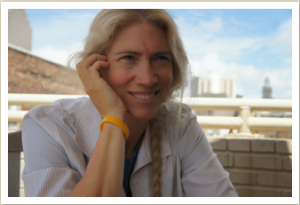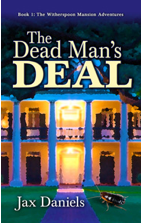Confession: I’ve let writing lapse lately and that feels BAD. Maybe that’s happened to you, too. Life gets in the way, and it’s hard enough to put one foot in front of the other, let alone put your fingers on the keyboard.
Seeking inspiration and writerly motivation, I spent this past Saturday and Sunday at Baycon 2014, one of the larger science fiction and fantasy conventions held annually in the San Francisco Bay Area. Along with Denise Tanaka and Jennifer Carson, I happily threw myself into the open arms of my fellow fen and found inspiration and motivation aplenty. Now here I am, writing, my fingers feeling fine as they tap the keys.
I woke at 5:00 in the morning, and the first song of the day on shuffle was Laura Line’s “Dreams.” Good omen! Dreams inspire (several of my short stories have come from dreams that I’ve remembered upon waking), and the con would be filled with fellow dreamers.
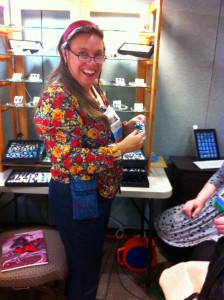
Jennifer Carson looking at jewelry
By 10:00 a.m., I was in the dealer’s room with Jennifer, drooling over jewelry from Angelwear Creations. Jennifer (and, later, Denise) were drawn to the fantasy-inspired necklaces, but I was drawn to the science fiction pieces: silver rocket earrings, necklaces of silver shuttles in orbit around gemstones that look like planets, pins shaped like spiral-armed galaxies studded with pearls. Motivational? You bet. It’s often hard to find beautiful jewelry inspired by science fiction; at the typical SFF convention, jewelry inspired by fantasy—Celtic designs, dragons, and (lately) steampunk gears–far outnumbers science fiction pieces, a state of affairs that reflects the relative popularity of the two genres in ways that I find depressing, given that I primarily write science fiction. So I bought a spaceship-circling-a-darkling-moon necklace and wore it during the rest of the con! Wearing that necklace, I could defy the oft-repeated, demotivational claim that “most women don’t read science fiction.”

Kevin Andrew Murphy being inspired by the menu
On Saturday, Denise, Jennifer, and I ate lunch alone. On Sunday, we were joined by several people from former writers groups whom I hadn’t seen in years, including Kevin Andrew Murphy and Wanda Kurtcu. (I had a chance to say howdy and thank you to Carrie Sessarego for her perceptive review of Skin Deep, my latest paranormal romance.) Sharing food and face-to-face conversations with these like-minded, long-lost friends, hearing how life and writing have treated them, helps put my own life and writing in perspective. Writing is a joy we can turn to when life isn’t.
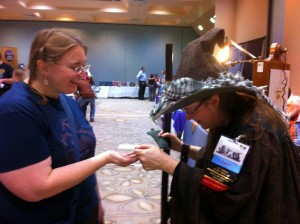
Denise Tanaka giving her business card to Elanor Finster
Friends who aren’t long-lost can also inspire. Denise is shy, but at the con, she made a conscious effort to stand out and market her work. In her wizard’s robe and hat, staff in hand, she asked at least one question at every panel, handed out her business cards, struck dramatic poses, and furthered her brand. Her example inspires me, motivates me, to look for ways to make marketing what I write as enjoyable as the writing is itself.
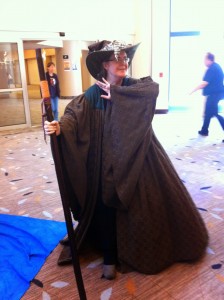
Denise Tanaka in full wixzrd robes with staff
Strangers, too, can inspire. Strangers in clever costumes. Strangers with smiles on their faces, complimenting my Firefly T-shirt or striking up a short conversation in line. Just being “of the Body” with the SFF community, being physically present in a place where so many others are, refreshes the spirit.
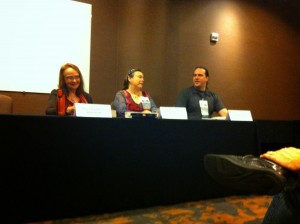
Maya Kaathryn Bohnhoff, Jennifer Carson, and Kyle Aisteach speaking at the panel on “Listening to That Critique”
Certainly I was motivated by the topics for panel discussion (designing an effective book cover, marketing your work, using a pen name, making use of critiques, avoiding cultural appropriation, etc.) and by listening to what the panelists (authors, editors, artists, independent publishers) had to say about writing and creativity. But I found equal value in observing the panelists’ behavior. Watching how they made fans comfortable at signings, in the hallways, or in the Q&As after the panels gave me ideas about what to do and say (and not to do or say).

Random signs
And the art: art in the dealers’ room, art in the artists’ room, random convention signage on the walls of the hotel–all inspirational. I wish I could show you images of the gorgeous, clever, thought-provoking artwork I saw, but I won’t infringe the copyrights. Looking at various paintings in the artists’ room, I thought about what would be inside a book if that painting were its cover, and although ideas for plot and characters came to mind, I found I was most inspired by the mood of the painting. I made a mental note to consider mood more consciously as I write.
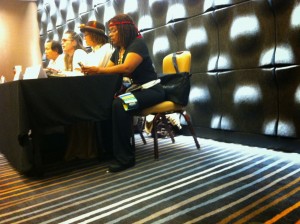
Brad Lyau, Margaret McGaffrey Fisk, Leslie Anne Moore, and Wanda Kurtcu at the panel on “Cultural Appropriation in SFF Media and Costuming”
When it was all over and I was back home, sitting on the couch in the dark while the cats roamed the room, I found myself pondering one panel in particular, the panel on cultural appropriation. The panel considered possible problems that can occur when a writer writes of a culture not his or her own, warning that such use can be offensive and harmful. In light of all the inspiration and motivation I’d been seeking at the con, I took this as a particularly apt caution.
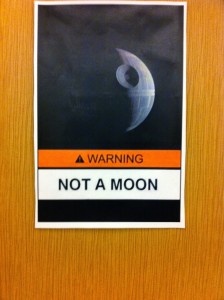
Apt cautionary sign on convention wall
As writers, we step outside ourselves to step inside ourselves. We take on the viewpoint of others in order to see ourselves more clearly. We create characters, we build worlds, we devise histories, we extrapolate or fantasize or faithfully recreate, all in words on a page outside of ourselves, all to better understand, explain, reflect, memorialize, realize something about ourselves. In writing about others, I come to know more about myself and am inevitably on some level writing about myself—myself among others, perhaps, but still myself. If I see others only from my own perspective, I see wrongly—not only those others, but also myself.
Hah! That’s rolling prose. I’m ready to write.
About Carolyn Hill
Carolyn received her doctorate in rhetoric from the University of California at Berkeley, studying the argumentative artistry of Sir James Frazer’s The Golden Bough. She has taught writing, both general and genre, for over thirty years. She is a gifted writer of short stories, which are available in her short story collection, Liminal Eyes. Those who like longer works should check out her two novels, Bead’s Pickle and Skin Deep. When Carolyn is not writing, she is hurling heavy objects into the air above her head.

